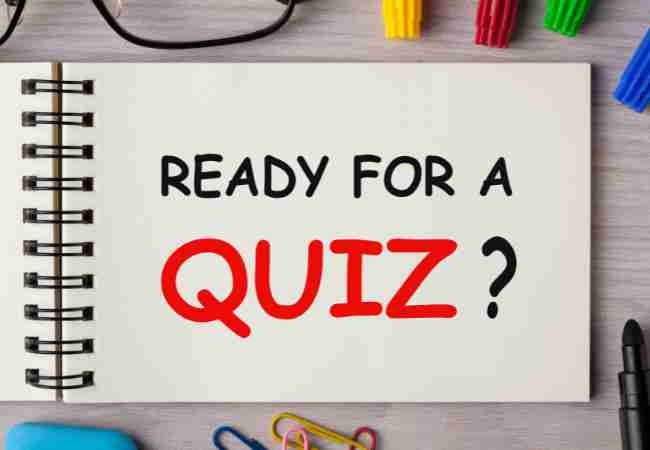Writing quiz questions is an essential skill for educators and instructional designers. Effective quiz questions not only assess learners’ knowledge and understanding but also engage them in the learning process. This article will guide you on how to write quiz questions that serve their purpose and provide valuable insights into learners’ progress.
Key Takeaways
- Identify the learning objectives before writing quiz questions.
- Engage learners by making the questions interesting and relevant.
- Assess knowledge and understanding with well-designed questions.
- Write clear and concise questions to avoid confusion.
- Use appropriate question types to match the learning objectives.
Understanding the Purpose of Quiz Questions
Identifying the Learning Objectives
The learning objectives of a quiz are the specific goals or outcomes that learners are expected to achieve by the end of the quiz. These objectives guide the design and content of the quiz questions, ensuring that they align with the desired learning outcomes. When identifying the learning objectives for a quiz, it is important to:
- Clearly define what knowledge or skills the quiz should assess
- Consider the level of difficulty or complexity appropriate for the target audience
- Align the objectives with the overall learning goals of the course or training program
By clearly identifying the learning objectives, quiz creators can create focused and relevant questions that effectively measure the learners’ understanding and mastery of the subject matter.
Engaging the Learners
Engaging learners is a crucial aspect of designing effective quiz questions. By creating questions that capture their attention and stimulate their thinking, you can enhance their learning experience. Here are some tips to engage learners:
- Use real-life scenarios or examples to make the questions relatable and relevant.
- Incorporate interactive elements, such as multimedia or interactive features, to make the questions more engaging.
- Include questions that require critical thinking or problem-solving skills to challenge learners.
Tip: Encourage learners to discuss and debate the quiz questions with their peers to foster active learning and deeper understanding.
Remember, the goal is to make the quiz questions not only informative but also enjoyable for the learners.

Assessing Knowledge and Understanding
Assessing knowledge and understanding is a crucial aspect of quiz questions. It allows instructors to gauge the level of comprehension and retention among learners. To effectively assess knowledge and understanding, consider the following:
- Use a variety of question formats, such as multiple choice, true/false, and fill in the blank, to test different levels of understanding.
- Include questions that require learners to apply their knowledge to real-world scenarios or problem-solving situations.
- Incorporate questions that assess higher-order thinking skills, such as analysis, evaluation, and synthesis.
Tip: Avoid using questions that solely rely on memorization or recall. Instead, focus on questions that encourage critical thinking and deeper understanding.
By incorporating these strategies, instructors can ensure that quiz questions effectively assess learners’ knowledge and understanding.
Designing Effective Quiz Questions
Writing Clear and Concise Questions
When writing questions, it is important to ensure that the questions are clear and concise. This helps to avoid any confusion or misinterpretation by the learners. To achieve this, consider the following tips:
- Use simple and straightforward language to convey the question.
- Keep the question short and to the point, focusing on the key concept or idea.
- Avoid using unnecessary jargon or technical terms that may confuse the learners.
- Break complex questions into multiple shorter questions, each addressing a specific aspect.
Remember, the goal is to present the question in a way that is easy to understand and answer, allowing the learners to demonstrate their knowledge and understanding effectively.
Using Appropriate Question Types
When designing quiz questions, it is important to choose the appropriate question types that align with the learning objectives and effectively assess the knowledge and understanding of the learners. Different question types serve different purposes and can provide valuable insights into the learners’ comprehension.
Here are some commonly used question types:
- Multiple Choice Questions (MCQs): These questions provide a set of options, with only one correct answer. MCQs are useful for testing factual knowledge and understanding.
- True or False Questions: These questions require the learners to determine whether a statement is true or false. True or false questions are effective for assessing basic understanding.
- Fill in the Blanks Questions: These questions present a sentence or a paragraph with missing words, and the learners need to fill in the blanks with the correct answers. Fill in the blanks questions assess the learners’ ability to recall and apply information.
Remember to choose question types that align with the learning objectives and provide a comprehensive assessment of the learners’ knowledge and understanding.
Avoiding Bias and Ambiguity
When designing quiz questions, it is crucial to avoid bias and ambiguity. Bias can unfairly influence the responses of learners, while ambiguity can lead to confusion and incorrect answers. To ensure fairness and clarity in quiz questions, consider the following:
- Use inclusive language that does not favor any particular group or perspective.
- Avoid using leading or loaded language that may steer learners towards a specific answer.
- Be mindful of cultural references or examples that may be unfamiliar or biased.
- Clearly define terms and avoid using jargon or technical language that learners may not understand.
Remember, the goal is to create quiz questions that accurately assess knowledge and understanding without introducing any form of bias or ambiguity.
Conclusion
In conclusion, writing effective quiz questions is essential for achieving the desired learning outcomes. By understanding the purpose of quiz questions, such as identifying learning objectives, engaging learners, and assessing knowledge and understanding, educators can design quizzes that effectively measure student learning.
It is important to write clear and concise questions, use appropriate question types, and avoid bias and ambiguity. By following these guidelines, educators can create quizzes that promote active learning and provide valuable feedback to students. So, the next time you are creating a quiz, remember to keep these tips in mind to ensure a successful learning experience.
Frequently Asked Questions
What is the purpose of quiz questions?
Quiz questions are used to assess knowledge and understanding, engage learners, and identify learning objectives.
How do I write clear and concise quiz questions?
To write clear and concise questions, use simple language, avoid jargon, and keep the questions focused and to the point.
What are some common question types used in quizzes?
Common question types used in quizzes include multiple choice, true or false, fill in the blanks, and matching.
How can I engage learners with quiz questions?
To engage learners with quiz questions, make the questions relevant to the topic, include visuals or multimedia, and provide immediate feedback.
How do I avoid bias and ambiguity in quiz questions?
To avoid bias and ambiguity in the questions, use neutral language, avoid leading or loaded questions, and provide clear instructions.
What is the role of learning objectives in quiz questions?
Learning objectives help guide the design of quiz questions by defining the desired knowledge and skills that learners should acquire.
Ready to transform your quizzes from simple questionnaires to engaging, interactive experiences?
Try Interact!
With Interact, you can craft professional-grade quizzes that not only assess knowledge but also captivate and educate your audience.
Whether you’re an educator, a business professional, or just looking to create more dynamic quizzes, Interact is your go-to platform.
Take your quiz game to the next level – give Interact a try and see the difference for yourself! 🚀🌟



Your article helped me a lot, is there any more related content? Thanks!